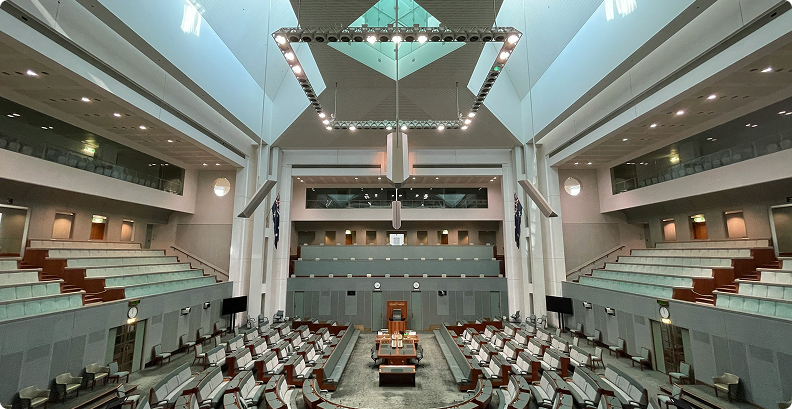Legislative Intervention for Private Higher Education Provider
Government Relations
Influencing the outcome of significant legislative change requires deep knowledge of the inner workings of Parliament and relationships with key decision makers and enablers. In the final sitting of 2024, Pyne & Partners successfully led a campaign to stop the passage of a significant education bill that would have detrimental implications for Australia’s economy and international standing. The three month campaign showcases Pyne & Partners’ ability to create impact in high-stakes political environments, making us a trusted partner for organisations seeking to influence public policy.

Project Overview
A major independent higher education (HE) provider with a primarily international cohort approached Pyne & Partners to delay the passing of the government’s Education Services for Overseas Student Amendment (Quality and Integrity) Bill 2024 (ESOS). The proposed bill, which had already passed through the House of Representatives and was advancing through the Senate, would impose caps on overseas student enrolments calculated based on a provider’s 2023 commencements.
For our client, the bill posed a threat to its commercial viability, with 2023 its worst year for enrolments due to the fallout from the pandemic. The cap that was calculated was significantly below its minimal viable number of students, necessitating staff cuts and campus closures. Recognising the need for immediate intervention, the client sought Pyne & Partners’ collective expertise to craft an urgent government relations campaign that would rally support for a fairer, more equitable alternative proposal to the ESOS bill.
Strategy and Approach
Pyne & Partners devised a targeted and timely government relations campaign tailored to our client’s needs. Our approach included the development of a stakeholder engagement plan focusing on the key Parliamentarians with deciding votes through meeting requests, tailored messaging and an on-the-ground Canberra campaign.
-
Parliamentary outreach: We identified key Parliamentarians from the Backbench and Opposition to engage in the relevant portfolios. Our team developed a targeted strategy that involved face-to-face meetings and private discussions with Senators, MPs and senior policy advisers.
-
Development of an alternative proposal: We ensured the collateral developed by our client was appropriate and distributed the materials to stakeholders to strengthen the client’s messaging.
-
Tailored messaging: We composed our client’s message to address the concerns of both government lawmakers and the public, emphasising the importance of international students for Australia’s broader economy as well as the sustainability of its education sector.
Milestones and Results
A timeline from the start of Pyne & Partners’ engagement shows the impact our interventions made on the outcome of the ESOS bill:
-
Sep 2024: The third Senate Committee hearing on the ESOS bill takes place. It is reported that the bill has enough support in the Senate to pass.
-
Oct 2024: The Senate committee recommends the bill go forward. It will appear on the legislative agenda for the next sitting week. Opposition raises concerns about the damage the bill will have on the education sector if it passes.
-
Nov 2024: The Senate sits for its second last week of the year. The same day the Coalition announces its plan to oppose the bill and releases a formal statement. The ESOS bill does not reappear in the Senate in the final sitting week and will not be voted on until the new year.
See attached media release from the Shadow Minister for Education.
The three-month campaign yielded significant results for our client:
-
Improved engagement with policymakers: Meeting requests were met with a high degree of receptiveness thanks to carefully crafted written communications, giving our client the opportunity to deliver comprehensive briefings to influential policymakers. The culmination of the campaign was a Canberra visit.
-
Increased awareness of the problem: By presenting data and industry voices that highlighted the challenges faced by private providers, discussions were framed in a way that was calculated to resonate with policymakers. The messaging underscored the need for a solution that both acknowledges endemic non-compliance amongst education providers and supports independent institutions in the wake of the pandemic, providing a nuanced understanding of the broader issue.
-
Increased opposition to the bill: Opposition to the bill was amplified by providing an alternative avenue to achieve the bill’s goals which resolves its most significant flaws. Rather than adopting a scattershot approach, strategically targeting Senators and MPs who would be receptive to our client’s proposal yielded a high degree of efficacy.
Conclusion
The Parliamentary campaign was ultimately successful in delaying the passing of the bill within a three-month timeframe. The campaign demonstrates how a tailored, strategic approach to lobbying can lead to a successful outcome in complex legislative environments. By understanding the nuances of our client’s concerns, engaging the right stakeholders, and delivering calculated messaging, we were able to avoid an unfavourable policy outcome for our client.